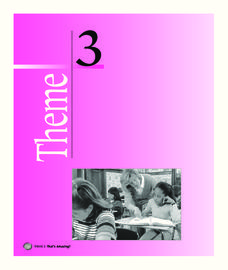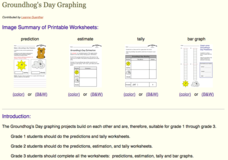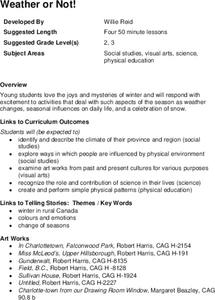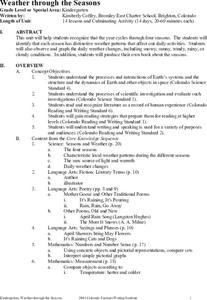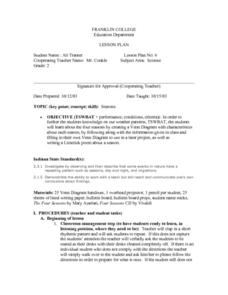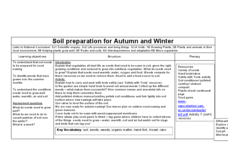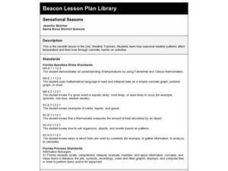Curated OER
Understanding Weather and Climate Patterns
Students research the climate patterns of various locations and make predictions based on their findings. They determine the importance of latitude and longitude in weather and climate. Students create graphs displaying their collected...
Curated OER
Writing About Winter
Students investigate the concept of winter as a season and they write an essay as a reflection upon the acquiring of new information. The class should have a list of vocabulary or a word wall available for observation to aid in the...
Core Knowledge Foundation
A Time for All Seasons - Spring
Celebrate the arrival of spring with this fun primary grade science unit. Engaging young scientists with a variety of hands-on activities and inquiry-based investigations, these lessons are a great way to teach children about...
Houghton Mifflin Harcourt
That’s Amazing!: English Language Development Lessons (Theme 3)
That's Amazing! is the theme of an English language development unit created by Houghton Mifflin. Following a speak, look, move, and listen routine, scholars delve into topics; seasons, weather, animals, landforms, telling...
Kid Zone
Groundhog's Day Graphing
This Groundhog's Day, challenge scholars to predict, estimate, tally, and graph in a weather-themed lesson in which class members play the role of the groundhog to forecast the weather come February second.
Curated OER
Weather and Water in Ghana
Students research the rainy and dry season to investigate Africa's weather. For this African weather lesson, students use the given websites to research the rainy and dry seasons of Ghana in Africa. Students then read stories about life...
Curated OER
Nebraska's Wild Weather
Students examine the weather in Nebraska. Using this information, they describe the cause and effect relationships in the environment based on these changes in weather. They write various types of poems with weather themes and share them...
Curated OER
Weather Watchers
Students conduct Internet research of their community's weather and compare it to the weather in another location. After conducting research, students become weather reporters by reporting their findings to the class by using a...
Curated OER
Climate and Weather
Students become familiar with weather terminology and different representations of data as they explore various on-line weather sites. They practice using and interpreting data determining the effects of the time of day, time of year and...
Core Knowledge Foundation
A Time for All Seasons - Summer
The sun is shining and the birds are singing, what better time to teach young learners about the fun season of summer. In this week-long science series, children learn how the rotation and orbit of the earth influence...
Curated OER
Weather or Not!
Students are introduced to the different climate regions of Canada. In groups, they discuss ways in which people are affected by the weather and how it limits their outdoor activities. They use artwork by Robert Harris to predict what...
Curated OER
Weather through the Seasons
Students examine the year's cycles by observing the four seasons, their distinctive weather patterns that affect our activities and the weather changes that each brings. The fourteen lessons of this unit offer a good opportunity for the...
Curated OER
Weather Patterns
Fourth graders collect and chart weather data over the course of the school year either using tools at school or media resources. They agree on weather terms to use in their observations and write them on the assigned sheet. Finally,...
Curated OER
Soil Preparation for Autumn and Winter
Students determine how and why soil needs to be prepared for the fall and winter seasons. In this agriculture lesson plan, students determine how to use gardening tools safely. They show how to work with compost material and fertilizer...
National Park Service
Glaciers and Water
Explore the amazing power of glaciers with a hands-on earth science experiment! After first learning basic background information, learners go on to create their very own chunks of frozen water and gravel in order to...
Teach Engineering
Dress for Success
Dressing for success is not always about looking sharp. Sometimes it is about staying warm and dry. Present your class with an activity that challenges groups of pupils to design a layered material for blizzard conditions. The teams test...
Curated OER
Sensational Seasons
Second graders explore how seasonal weather patterns affect temperature and their lives.
Curated OER
Seasons of the Year
Students explore season change. In this season change lesson ,students investigate weather events, Earth's movement and celestial events. Students watch videos and list weather events that happen in winter, spring, summer, and fall....
Curated OER
Weather Olympics
Students consider the effects of topography on climate patterns. In this earth science lesson, students research weather patterns and make inferences of how the land forms may create different climates. Students compare Celsius...
Curated OER
Weather Prediction
In this weather worksheet, high schoolers review vocabulary words and concepts associated with predicting the weather. Students understand what a meteorologist studies. This worksheet has 7 matching, 10 fill in the blank, and 5 short...
Curated OER
Unit of Study Mural
Students make a mural after reading about the art of Diego Rivera. In this mural lesson plan, students read a book about Diego Rivera, discuss him and his artwork, and make their own class mural.
Peace Corps
Weather and Water in Ghana
Students investigate the climate of their region. Students research statistics and conduct interviews. Students take a virtual tour of Ghana and discuss its climate. Students consider water conservation and the role it plays in both...
Curated OER
The Earth's Atmosphere and Temperature
Students describe and compare the layers of the atmosphere. They explain how to measure the temperature of the atmosphere and discover what causes the atmosphere to heat up in some places more than in others.
Curated OER
Designing Local Studies
Young scholars think about and identify significant aspects of local weather patterns by reflecting on their own observations. They design local weather studies by deciding which information to collect and how to collect and record it...





